|
Pantsir-S1
Air Defense Missile/Gun System |
||||||||||||||||||||||||||||||||||||||||||
|
||||||||||||||||||||||||||||||||||||||||||
|
Platforms for the Pantsir-S1 AD System |
||||||||||||||||||||||||||||||||||||||||||
|
|
||||||||||||||||||||||||||||||||||||||||||
|
|
||||||||||||||||||||||||||||||||||||||||||
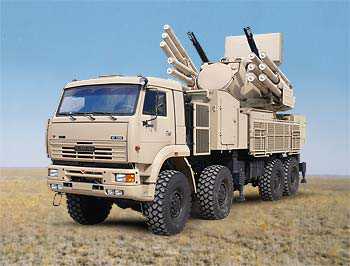

|
Pantsir-S1
Air Defense Missile/Gun System |
||||||||||||||||||||||||||||||||||||||||||
|
||||||||||||||||||||||||||||||||||||||||||
|
Platforms for the Pantsir-S1 AD System |
||||||||||||||||||||||||||||||||||||||||||
|
|
||||||||||||||||||||||||||||||||||||||||||
|
|
||||||||||||||||||||||||||||||||||||||||||

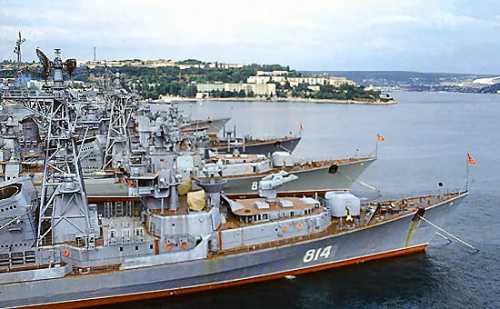
Ron Synovitz

More than its weapons sales to the regime of Syrian President Bashar al-Assad, Russia’s greatest strategic and geopolitical interest in Syria is the use of a deep-water port at Tartus. How long has Moscow been using Syria’s port at Tartus as a strategic naval base in the Mediterranean?
The Soviet Navy began using Syria’s deep-water port at Tartus for submarines and surface vessels under a 1971 agreement with Damascus. The Soviet Union was Syria’s main arms supplier and Tartus was used to receive Soviet weapons bought by Damascus.
The Soviet Fifth Mediterranean Squadron also used the docks at the base to load its own fuel and supplies. The Soviet Navy had similar support points in Egypt, but the Soviets evacuated the Egyptian bases in the late 1970s, sending ships and equipment to Tartus instead.
That transformed Tartus into the Soviet 229th Naval and Estuary Vessel Support Division. In the mid 1980s, Tartus was upgraded to become the 720th Logistics Support Point for the Soviet Navy. The Russian Navy continued using Tartus after the Soviet broke up in 1991.
How has Russia managed to maintain a presence at Tartus after the collapse of the Soviet Union? By 1990, Syria had built up debts of $13.4 billion to Moscow largely due to weapons purchases by Damascus. In May 2005, Russian Finance Minister Aleksei Kudrin signed a deal with Syrian Finance Minister Muhammad al-Hussein that wrote off 73 percent of Syria’s Soviet-era debt.
Russia ensured that it continued to have base rights at Tartus under the 1971 treaty as a result of the debt write-off deal, which cleared the way for Damascus to make fresh weapons purchases from Russia.
In terms of logistics, how does Russia’s presence at Tartus bolster Syrian President Bashar al-Assad’s regime? Tartus is the receiving point for Russian weapons shipments to Syria. The port is the country’s transport hub for newly purchased arms as well as for weapons that must be returned to Russia for repair, such as attack helicopters. The port is linked inland to a well-developed network of roads and highways.
Syria’s only railway passenger connection from Tartus is linked to the port of Latakia further north. However, the national railway operator, Chimins de Fer Syriens, also operates military transport routes from Tartus to major cities across Syria.
How does Tartus serve Russia’s strategic and geopolitical interests? Even a semipermanent base at Tartus allows the Russian Navy to expand its presence in the eastern Mediterranean Sea. Russia’s largest and most important military base in a foreign country is the Black Sea Fleet base in Sevastopol, Ukraine.
To deploy beyond the Black Sea, Russian warships based at Sevastopol must pass through the Bosporus Strait, which has been militarized by NATO-member Turkey.
Under the 1936 Montreux Convention, the Bosporus was deemed an international shipping lane with military restrictions. Under a 1982 amendment, Turkey now retains the right to close the Strait at its discretion in peacetime as well as during wartime.
As Russia’s only Mediterranean base, that makes Tartus a vital strategic asset beyond the Bosporus. As a deep water port, it can dock nuclear submarines. Moscow is reportedly planning to expand the facilities so it can accommodate the Russian Navy’s flagship — the “Admiral Kuznetsov” aircraft carrier — after 2012.
Tartus also strengthens Russia’s great-power aspirations and increases its influence in regional diplomacy.
Could Russia’s use of Tartus be affected by the ouster of Assad’s regime? Analysts agree that Russian vetoes of UN Security Council resolutions against Assad’s crackdown on dissent, as well as Russian weapons sales to the regime, make it likely that an opposition government replacing Assad would try to strip away Russia’s rights to use Tartus.
Last autumn, as popular opposition to Assad’s regime was growing, Russia took steps to expand basing rights for its warships in Venezuela. It also deployed a naval task force to Tartus, led by the “Admiral Kuznetsov” aircraft carrier, which is staying nearby for what Moscow describes as a long-term training mission in the Mediterranean and Atlantic.
Ron Synovitz writes for RFE/RL, from where this article is adapted.
via The Cutting Edge News.
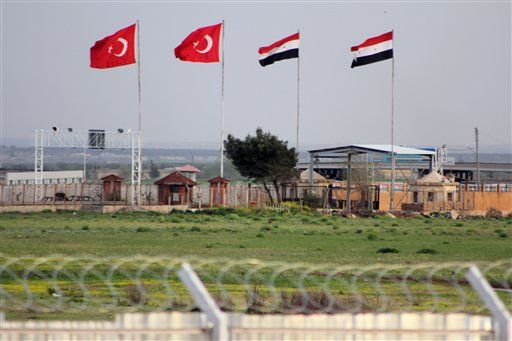

By Kate Schwartz, Newser Staff
(Newser) – Turkey is sticking to its story: Syria shot down one of its jets on June 22 in international airspace, and did so far enough from Syria that the plane couldn’t have been felled by an antiaircraft gun. US intelligence, however, indicates the very opposite may have happened, reports the Wall Street Journal. US officials believe Syrian forces took down the plane using antiaircraft guns that have a 1.5-mile range while it was in Syrian airspace. “We see no indication that it was shot down by a surface-to-air missile” as Turkey claims, said a senior defense official.
And while officials didn’t reveal how they got their info, they did share a few more specifics: If antiaircraft fire was indeed used, then the Turkish plane was likely flying slowly and low to the ground (countering Turkey’s claim that it was traveling at 480mph). It could also indicate that a local commander made the call to fire (the use of a missile would have had to come from Damascus). And some speculate the flight’s path was all part of a test to see “how fast they get picked up and how fast someone responds,” said US official. “It’s part of training.” The Journal writes that, thanks to warmer ties between the US and Turkey, it doubts the “apparent discrepancies” will chill relations.
via US Intel on Downed Jet: Turkey’s Story Rings False – US finds plane was likely shot down while still in Syrian airspace.


June 30, 2012 – 17:07 AMT
PanARMENIAN.Net – U.S. intelligence indicates that a Turkish warplane shot down by Syrian forces was most likely hit by shore-based antiaircraft guns while it was inside Syrian airspace, American officials said, a finding in tune with Syria’s account and at odds with Turkey, The Wall Street Journal reports.
The Turkish government, which moved tanks to the Syrian border after the June 22 incident, says the debris fell in Syrian waters, but maintains its fighter was shot down without warning in international airspace. Ankara also has said the jet was hit too far from Syrian territory to have been engaged by an antiaircraft gun.
Damascus has said it shot down the plane with an antiaircraft battery with an effective range of about 1.5 miles.
“We see no indication that it was shot down by a surface-to-air missile” as Turkey says, said a senior defense official. Officials declined to specify the sources of their information. The senior U.S. defense official cautioned that much remains unknown about the incident.
A Turkish official said he wasn’t aware of the American doubts, and reiterated the government’s position that a Syrian missile downed the plane in international airspace.
The downing of the jet spurred fears of a widening regional conflict and led the North Atlantic Treaty Organization, following a presentation by Turkey, to condemn Syria’s action.
The use of antiaircraft fire would suggest the Turkish plane was flying low to the ground, and slowly, U.S. officials said – though Syria said the jet was traveling at 480 miles an hour. If hit by antiaircraft fire, the jet likely came closer to the Syrian shoreline than Turkey says, U.S. officials said.
According to the Journal, some current and former American officials believe Ankara has been testing Syrian defenses. The version of the Turkish F-4 Phantom that was shot down typically carries surveillance equipment, according to U.S. defense officials.
A former senior U.S. official who worked closely with Turkey said he believed the flight’s course was meant to test Syria’s response. “You think that the airplane was there by mistake?” the former official said.
“These countries are all testing how fast they get picked up and how fast someone responds,” said a senior U.S. official. “It’s part of training.”
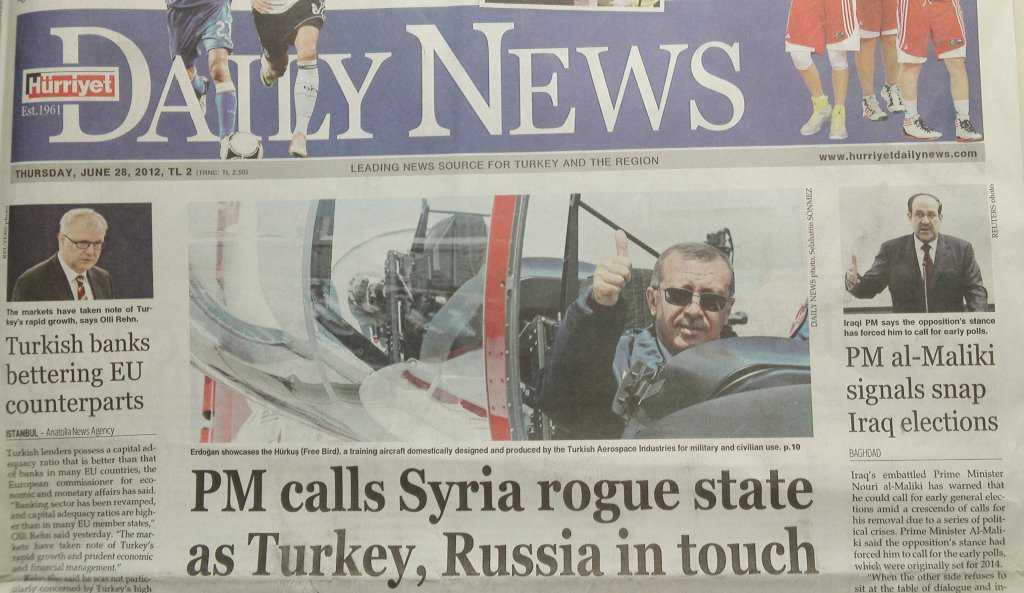
Is it a coincidence that, on the same day Turkish Prime Minister Recep Tayyip Erdogan called Syria a “rogue state,” he had his picture taken in the cockpit of a jet?
 Conceivably. The photo-op was a presumably long-scheduled promotion for Turkish Aerospace Industries. Still, here in Instanbul the juxtaposition did not go unnoticed. The front page above–from the Daily News, the English-language counterpart to Hurriyet–was typical of Turkish newspapers today. And for the last several days Turkish columnists have been pondering whether, after Syria’s downing of a Turkish jet near the Syrian-Turkish border, the chances of war between the two countries have grown appreciably.
Conceivably. The photo-op was a presumably long-scheduled promotion for Turkish Aerospace Industries. Still, here in Instanbul the juxtaposition did not go unnoticed. The front page above–from the Daily News, the English-language counterpart to Hurriyet–was typical of Turkish newspapers today. And for the last several days Turkish columnists have been pondering whether, after Syria’s downing of a Turkish jet near the Syrian-Turkish border, the chances of war between the two countries have grown appreciably.
It’s an important question, because in the event of sustained hostilities Turkey would likely become the leading edge of an invasion of Syria backed by various Arab states and Western powers, including America. And this would make it hard for Russia, which has a valuable naval base in Syria, to stand idly by.
The closest thing to a consensus here seems to be that the answer is yes, Turkey is closer to war, but only marginally.
The affirmative answer derives partly from Erdogan’s statement that “the rules of engagement have changed” in light of the Turkish jet’s downing, and that Turkey would now respond aggressively to Syrian provocations that might in the past have drawn a more measured reaction. Even leaving aside what this says about Erdogan’s actual inclination, it reduces his political room for maneuvering in the event that there should indeed be another Syrian provocation.
The reason for judging that, nonetheless, the chances of war have grown only marginally, is twofold.
First, Erdogan’s response to the crisis has on balance been circumspect. When he consulted with NATO, he did so under Article 4, which sanctions “consultations” among NATO members, not Article 5, which would have been more of a call to action. (This decision may reflect his perception that other NATO nations are in no mood for war, but, if so, that reality itself militates against war.) And the same headline, above, that has him calling Syria a rogue state has him also conferring with Russia. Turkey, which does a lot of business with Russia, has no interest in reviving Cold War fault lines, to say nothing of starting an actual war in which Russia is on the enemy’s side.
Even Erdogan’s cockpit photo-op was in a sense measured. Though willing to pose in a jet used for both civilian and military training, he wouldn’t let himself be photographed with a more unambiguously belligerent aircraft, an attack helicopter that was also unveiled by Turkish Aerospace Industries yesterday.
The other reason the chances of war have risen only marginally is that they were already nontrivial. Turkey, according to the New York Times, has become the staging ground for an effort, coordinated by the United States, to give the Syrian rebels arms that are paid for by Saudia Arabia, Qatar, and, yes, Turkey. By both hosting and helping to bankroll this effort, Turkey already qualilfies, from Syria’s point of view, as a hostile power. As if to underscore this point, Turkey admits that the plane downed by Syria had violated Syrian airspace, though it insists the plane was back in international airspace when shot down.
All told, the main result of the downing of the plane was to underscore the fact that Turkey and Syria had already moved some distance toward war. Erdogan’s response seems to have been designed to keep them from moving any closer, except to the extent that is required of a leader who wants to reassure his people that he’s no wimp.
[Postscript: For the view that Erdogan’s response to the crisis did more than merely balance the dictates of domestic politics with a desire to avoid war, and actually accomplished something tactically important, see this post from Michael Koplow’s blog Ottomans and Zionists.]
via International – Robert Wright – Are Turkey and Syria Headed for War? – The Atlantic.
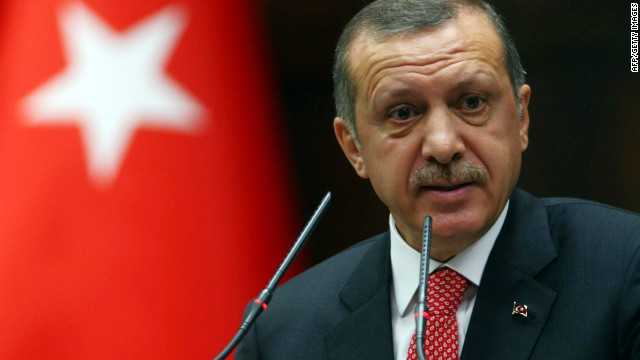

Editor’s note: Mustafa Akyol is a Turkish journalist and the author of “Islam without Extremes: A Muslim Case for Liberty.” (WW Norton, 2011)
Istanbul, Turkey (CNN) — The downing of a Turkish jet over the Mediterranean last Friday by a Syrian missile took Turkish-Syrian tensions to a new level. Though the Turkish government did not declare war as some expected, and others feared, it did declare Syria a “clear and present danger” and raised its rules of engagement to an alert level.
How we came to this point is an interesting story. The 550-mile long border with Syria, Turkey’s longest, has often been tense. During the Cold War, Syria was a Soviet ally, Turkey was a NATO member (as it still is) and the border was heavily mined. Moreover, Hafez Assad, the father and predecessor of Syria’s current dictator, Bashar al-Assad, supported and hosted the PKK, the outlawed Kurdistan Workers Party, which has led a guerrilla war against Turkey since the early ’80s. (PKK is defined by Turkey and the United States as a terrorist group.) Turkey had come close to waging a war against Syria in 1999 because of this PKK connection.
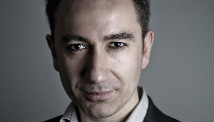
However, the relations surprisingly changed for the better in the first decade of the new century. Bashar al-Assad, who replaced his father in 2000, seemed to promise a more open and friendly Syria. In Turkey, the Justice and Development Party of Recep Tayyip Erdogan, which came to power in 2002, initiated a foreign policy of “zero problems with neighbors.” This led to a fruitful Turkish-Syrian rapprochment: Erdogan and Assad became friends, trade between the two countries was boosted, and borders were opened for visa-free travel. Just two years ago, the two countries looked like the core states of a would-be Middle Eastern Union modeled after the EU.
But this honeymoon came to an abrupt end with the Arab Spring. The Erdogan government, whose claims include democratizing Turkey by saving it from the tutelage of the country’s overbearing military, intuitively sympathized with and announced support for this democratic wave in the region. Yet while this proved to be a winning game in Tunisia, Egypt and Libya, Syria turned out to be a tougher case.
Throughout the initial months of the demonstrations in Syria, which began in March 2011, the Turkish government hoped and tried to persuade al-Assad’s regime to allow a peaceful transition to democracy. This hope was gradually replaced by frustration, however, and Erdogan soon began to condemn the “barbarism” and “savagery” of the Syrian regime. The trouble for him, as it usually is, was also personal: As he said in the Turkish Parliament on June 21, Assad had promised him change and reform but proved to be a liar instead.
Consequently, Turkey rapidly emerged as one of the boldest supporters of the Syrian opposition, and the Syrian National Council, formed as the dissidents’ umbrella group, found a base in Turkey. Meanwhile, at least 15,000 refugees from Syria, both dissidents and their families, were given shelter on the Turkish side of the Syrian border.
Moreover, the Free Syrian Army, a rebel group formed by the Syrian soldiers who deserted to the opposition’s side, not only operated from Turkey but, according to some reports, were helped with arms and other supplies as well. The Syrian response was to add Turkey to its own version of the axis of evil — the United States, NATO, Saudi Arabia and in fact much of the rest of the world — in its official propaganda.
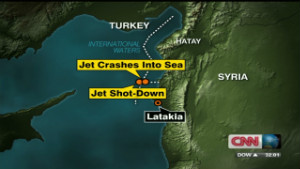 NATO, Turkey slam Syria over downed jet
NATO, Turkey slam Syria over downed jet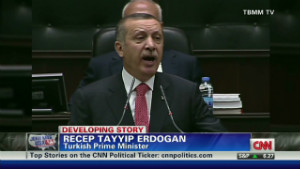 Tough talk from NATO, but no action
Tough talk from NATO, but no action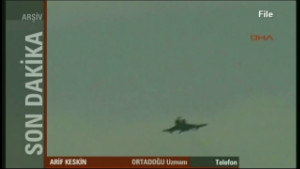 Unsettled neighbors
Unsettled neighbors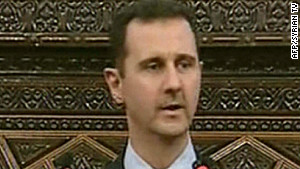 al-Assad: Syria ‘in a state of real war’
al-Assad: Syria ‘in a state of real war’Inside Turkey, this engagement in the Syrian crisis has supporters and critics. The supporters are mostly Sunni conservatives who strongly identify with the Syrian opposition, which include the Syrian Muslim Brotherhood. (The massacre of thousands of Sunnis in Hama in 1982 by Hafez Assad had been a tragic memory in the minds of these conservative Turks, who now believe that the Syrian leopard has simply not changed its spots.)
Other voices in Turkey, ranging from hardcore secularists to pro-Iranian marginal Islamists, accuse the government for being naively involved in a conflict cooked up by “Western imperialists.”
The plane incident came on top of all this. The downed jet was apparently an unarmed but military aircraft which, according to the Turkish government, was on a peaceful mission to test the NATO radar system based in eastern Turkey. Syrians said the plane violated Syrian airspace and was shot within it.
The Turkish government said the plane violated the Syrian airspace “mistakenly and very briefly” but was hit by a Syrian missile despite immediately having reverted to international airspace. The plane’s two pilots, who apparently fell to the sea, are missing.
The Turkish reaction to the incident was outlined by Erdogan in an address in the parliament that came four days after the incident. In a very strident tone against the “bloody dictator of Syria,” Erdogan announced that Turkey now sees its southern neighbor as a “clear and present danger” and will change its rules of engagement: “Any military element that approaches the Turkish border from Syria by posing a security risk will be regarded as a threat, and will be treated as a military target.” The very same day, some Turkish tanks on the Syrian border were repositioned, implying that Ankara meant business.
Yet almost no one in Turkey seems enthusiastic for war. Many here point out that Turkey’s ascendance in the past decade has been thanks to its “soft power.” That mainly rested on the country’s economic boom and democratic reforms, which seemed to present a synthesis of Islam, free-market capitalism and political liberalism.
But should Turkey now consider putting some “hard power” on the table, without which it might become ineffective in its region? This is a question that Turks are passionately discussing these days, and the answer seems to matter a lot for the Syrians as well.